Business Law Report: Parliament, Business Structures, and Law
VerifiedAdded on 2020/11/12
|14
|4845
|253
Report
AI Summary
This business law report provides a detailed analysis of key legal concepts relevant to businesses in the UK. It begins with an introduction to business law, encompassing commercial and civil laws, and then delves into the concept of parliamentary sovereignty, explaining its significance and the process of passing bills into law. The report then explores various sources of law in the UK, including statutory, common, and equity laws, highlighting their importance. It further examines the role of the government in making laws and the step-by-step process of passing a bill in Parliament. The report also assesses the potential impact of company, contract, and employment laws on businesses, emphasizing the legal requirements and implications of each. Finally, the report contrasts incorporated and unincorporated business structures, discussing their differences in terms of ownership, formation, funding, management, and legal liabilities, as well as providing insights into legal solutions for business problems.
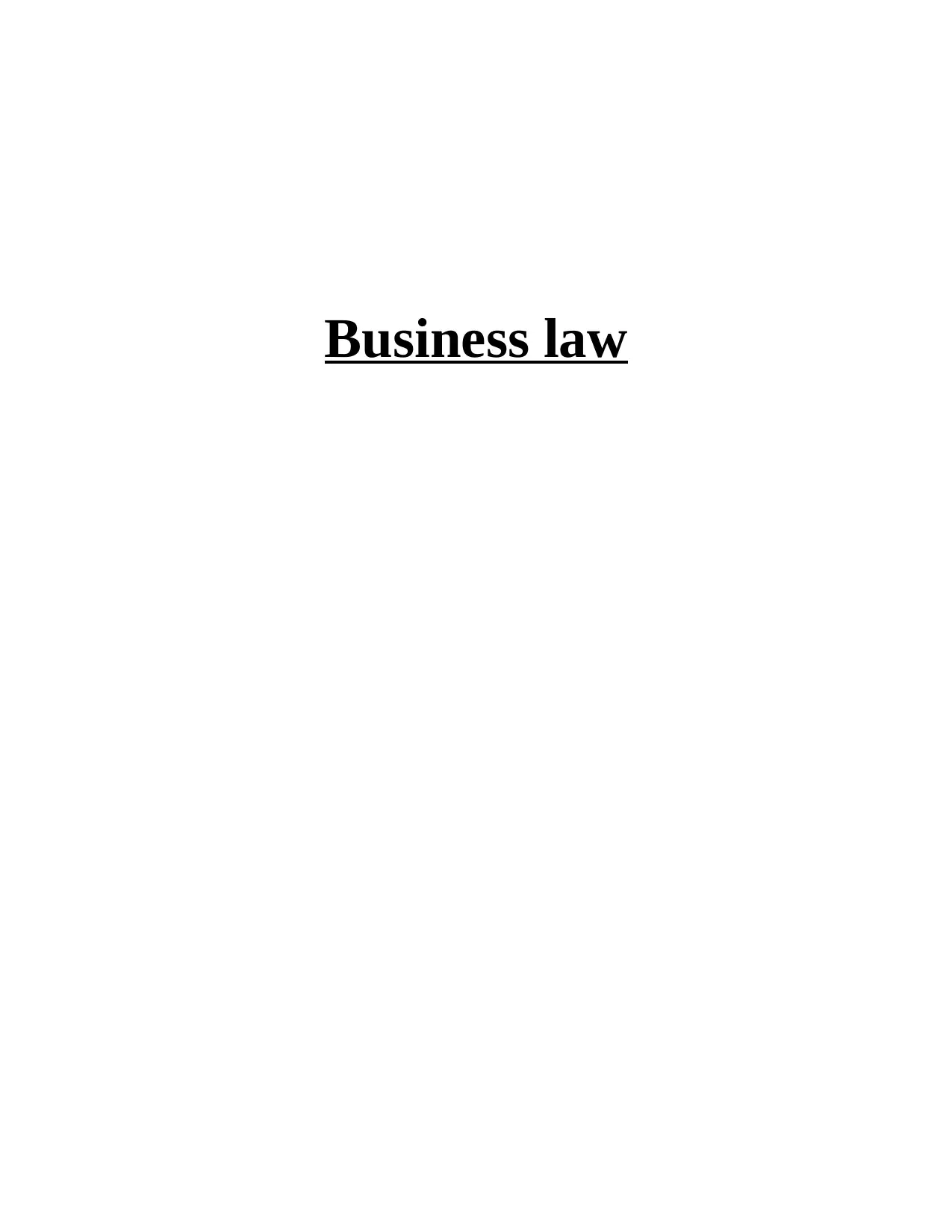
Business law
Paraphrase This Document
Need a fresh take? Get an instant paraphrase of this document with our AI Paraphraser
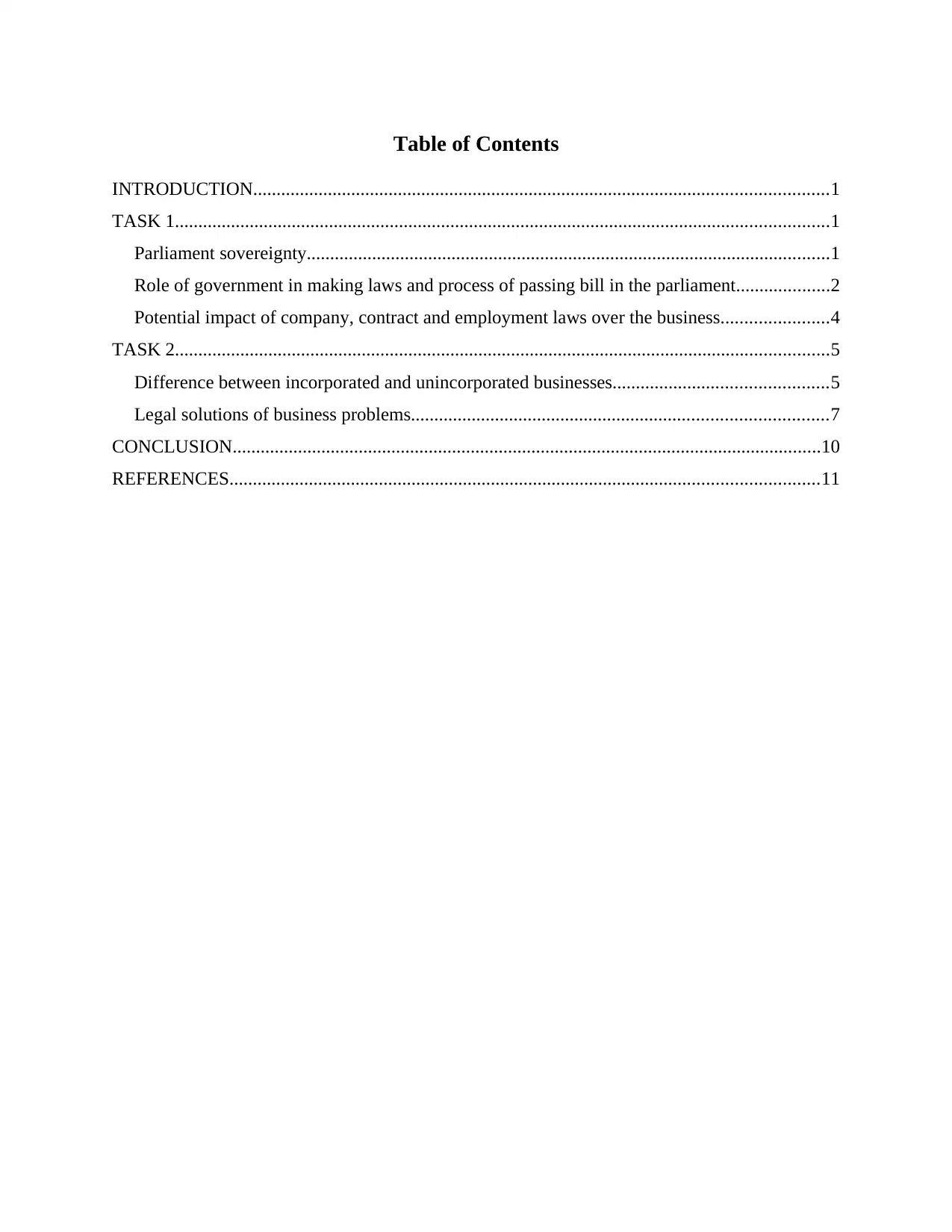
Table of Contents
INTRODUCTION...........................................................................................................................1
TASK 1............................................................................................................................................1
Parliament sovereignty................................................................................................................1
Role of government in making laws and process of passing bill in the parliament....................2
Potential impact of company, contract and employment laws over the business.......................4
TASK 2............................................................................................................................................5
Difference between incorporated and unincorporated businesses..............................................5
Legal solutions of business problems.........................................................................................7
CONCLUSION..............................................................................................................................10
REFERENCES..............................................................................................................................11
INTRODUCTION...........................................................................................................................1
TASK 1............................................................................................................................................1
Parliament sovereignty................................................................................................................1
Role of government in making laws and process of passing bill in the parliament....................2
Potential impact of company, contract and employment laws over the business.......................4
TASK 2............................................................................................................................................5
Difference between incorporated and unincorporated businesses..............................................5
Legal solutions of business problems.........................................................................................7
CONCLUSION..............................................................................................................................10
REFERENCES..............................................................................................................................11
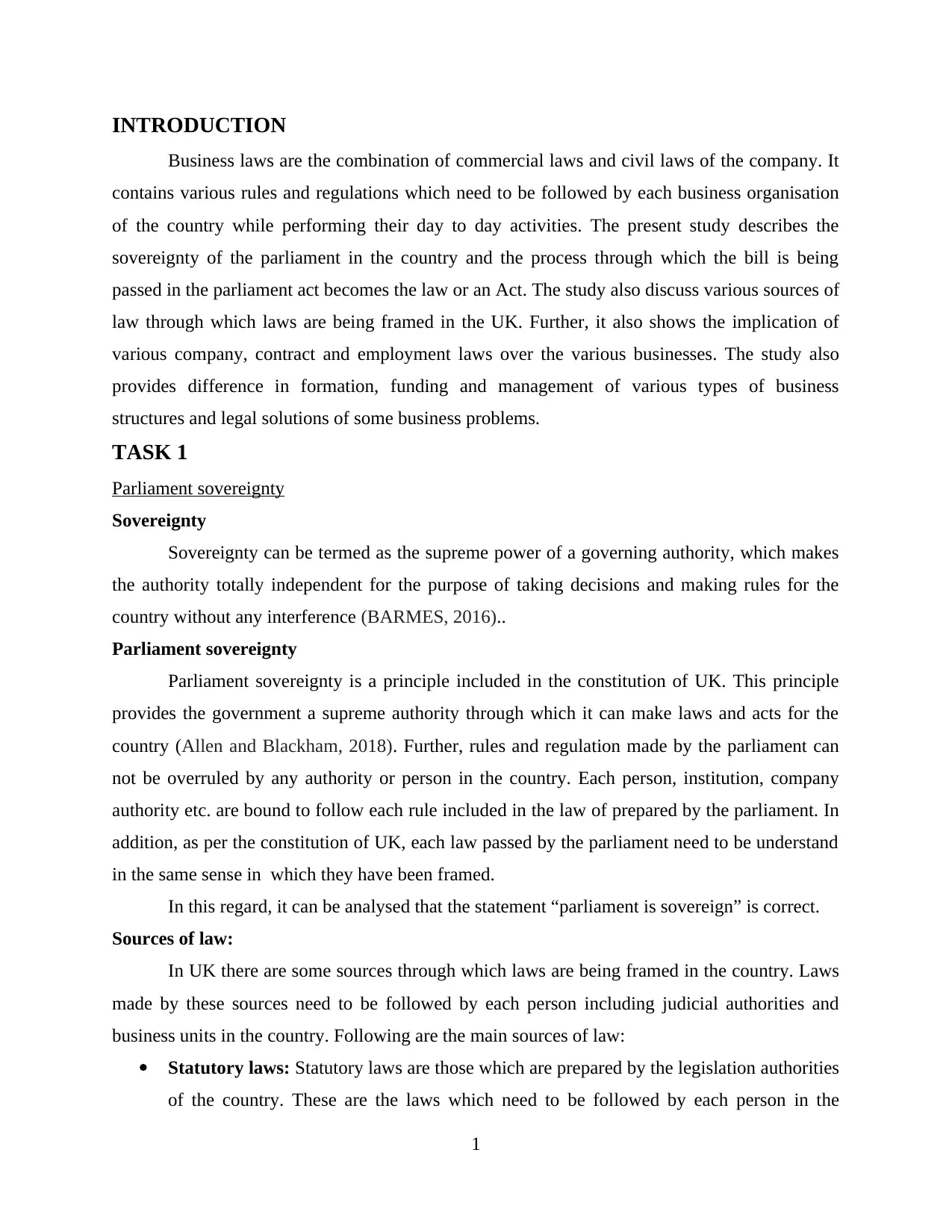
INTRODUCTION
Business laws are the combination of commercial laws and civil laws of the company. It
contains various rules and regulations which need to be followed by each business organisation
of the country while performing their day to day activities. The present study describes the
sovereignty of the parliament in the country and the process through which the bill is being
passed in the parliament act becomes the law or an Act. The study also discuss various sources of
law through which laws are being framed in the UK. Further, it also shows the implication of
various company, contract and employment laws over the various businesses. The study also
provides difference in formation, funding and management of various types of business
structures and legal solutions of some business problems.
TASK 1
Parliament sovereignty
Sovereignty
Sovereignty can be termed as the supreme power of a governing authority, which makes
the authority totally independent for the purpose of taking decisions and making rules for the
country without any interference (BARMES, 2016)..
Parliament sovereignty
Parliament sovereignty is a principle included in the constitution of UK. This principle
provides the government a supreme authority through which it can make laws and acts for the
country (Allen and Blackham, 2018). Further, rules and regulation made by the parliament can
not be overruled by any authority or person in the country. Each person, institution, company
authority etc. are bound to follow each rule included in the law of prepared by the parliament. In
addition, as per the constitution of UK, each law passed by the parliament need to be understand
in the same sense in which they have been framed.
In this regard, it can be analysed that the statement “parliament is sovereign” is correct.
Sources of law:
In UK there are some sources through which laws are being framed in the country. Laws
made by these sources need to be followed by each person including judicial authorities and
business units in the country. Following are the main sources of law:
Statutory laws: Statutory laws are those which are prepared by the legislation authorities
of the country. These are the laws which need to be followed by each person in the
1
Business laws are the combination of commercial laws and civil laws of the company. It
contains various rules and regulations which need to be followed by each business organisation
of the country while performing their day to day activities. The present study describes the
sovereignty of the parliament in the country and the process through which the bill is being
passed in the parliament act becomes the law or an Act. The study also discuss various sources of
law through which laws are being framed in the UK. Further, it also shows the implication of
various company, contract and employment laws over the various businesses. The study also
provides difference in formation, funding and management of various types of business
structures and legal solutions of some business problems.
TASK 1
Parliament sovereignty
Sovereignty
Sovereignty can be termed as the supreme power of a governing authority, which makes
the authority totally independent for the purpose of taking decisions and making rules for the
country without any interference (BARMES, 2016)..
Parliament sovereignty
Parliament sovereignty is a principle included in the constitution of UK. This principle
provides the government a supreme authority through which it can make laws and acts for the
country (Allen and Blackham, 2018). Further, rules and regulation made by the parliament can
not be overruled by any authority or person in the country. Each person, institution, company
authority etc. are bound to follow each rule included in the law of prepared by the parliament. In
addition, as per the constitution of UK, each law passed by the parliament need to be understand
in the same sense in which they have been framed.
In this regard, it can be analysed that the statement “parliament is sovereign” is correct.
Sources of law:
In UK there are some sources through which laws are being framed in the country. Laws
made by these sources need to be followed by each person including judicial authorities and
business units in the country. Following are the main sources of law:
Statutory laws: Statutory laws are those which are prepared by the legislation authorities
of the country. These are the laws which need to be followed by each person in the
1
⊘ This is a preview!⊘
Do you want full access?
Subscribe today to unlock all pages.

Trusted by 1+ million students worldwide
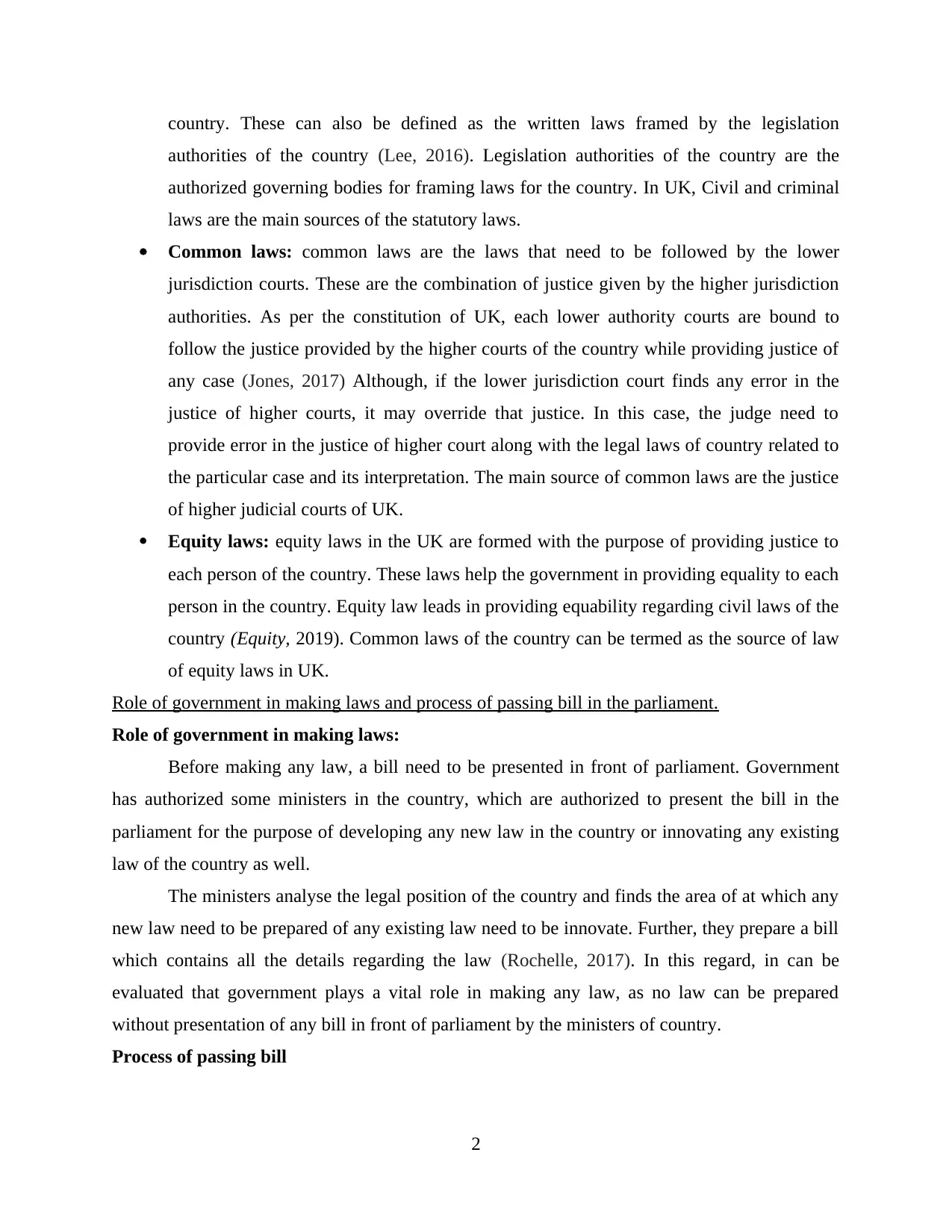
country. These can also be defined as the written laws framed by the legislation
authorities of the country (Lee, 2016). Legislation authorities of the country are the
authorized governing bodies for framing laws for the country. In UK, Civil and criminal
laws are the main sources of the statutory laws.
Common laws: common laws are the laws that need to be followed by the lower
jurisdiction courts. These are the combination of justice given by the higher jurisdiction
authorities. As per the constitution of UK, each lower authority courts are bound to
follow the justice provided by the higher courts of the country while providing justice of
any case (Jones, 2017) Although, if the lower jurisdiction court finds any error in the
justice of higher courts, it may override that justice. In this case, the judge need to
provide error in the justice of higher court along with the legal laws of country related to
the particular case and its interpretation. The main source of common laws are the justice
of higher judicial courts of UK.
Equity laws: equity laws in the UK are formed with the purpose of providing justice to
each person of the country. These laws help the government in providing equality to each
person in the country. Equity law leads in providing equability regarding civil laws of the
country (Equity, 2019). Common laws of the country can be termed as the source of law
of equity laws in UK.
Role of government in making laws and process of passing bill in the parliament.
Role of government in making laws:
Before making any law, a bill need to be presented in front of parliament. Government
has authorized some ministers in the country, which are authorized to present the bill in the
parliament for the purpose of developing any new law in the country or innovating any existing
law of the country as well.
The ministers analyse the legal position of the country and finds the area of at which any
new law need to be prepared of any existing law need to be innovate. Further, they prepare a bill
which contains all the details regarding the law (Rochelle, 2017). In this regard, in can be
evaluated that government plays a vital role in making any law, as no law can be prepared
without presentation of any bill in front of parliament by the ministers of country.
Process of passing bill
2
authorities of the country (Lee, 2016). Legislation authorities of the country are the
authorized governing bodies for framing laws for the country. In UK, Civil and criminal
laws are the main sources of the statutory laws.
Common laws: common laws are the laws that need to be followed by the lower
jurisdiction courts. These are the combination of justice given by the higher jurisdiction
authorities. As per the constitution of UK, each lower authority courts are bound to
follow the justice provided by the higher courts of the country while providing justice of
any case (Jones, 2017) Although, if the lower jurisdiction court finds any error in the
justice of higher courts, it may override that justice. In this case, the judge need to
provide error in the justice of higher court along with the legal laws of country related to
the particular case and its interpretation. The main source of common laws are the justice
of higher judicial courts of UK.
Equity laws: equity laws in the UK are formed with the purpose of providing justice to
each person of the country. These laws help the government in providing equality to each
person in the country. Equity law leads in providing equability regarding civil laws of the
country (Equity, 2019). Common laws of the country can be termed as the source of law
of equity laws in UK.
Role of government in making laws and process of passing bill in the parliament.
Role of government in making laws:
Before making any law, a bill need to be presented in front of parliament. Government
has authorized some ministers in the country, which are authorized to present the bill in the
parliament for the purpose of developing any new law in the country or innovating any existing
law of the country as well.
The ministers analyse the legal position of the country and finds the area of at which any
new law need to be prepared of any existing law need to be innovate. Further, they prepare a bill
which contains all the details regarding the law (Rochelle, 2017). In this regard, in can be
evaluated that government plays a vital role in making any law, as no law can be prepared
without presentation of any bill in front of parliament by the ministers of country.
Process of passing bill
2
Paraphrase This Document
Need a fresh take? Get an instant paraphrase of this document with our AI Paraphraser
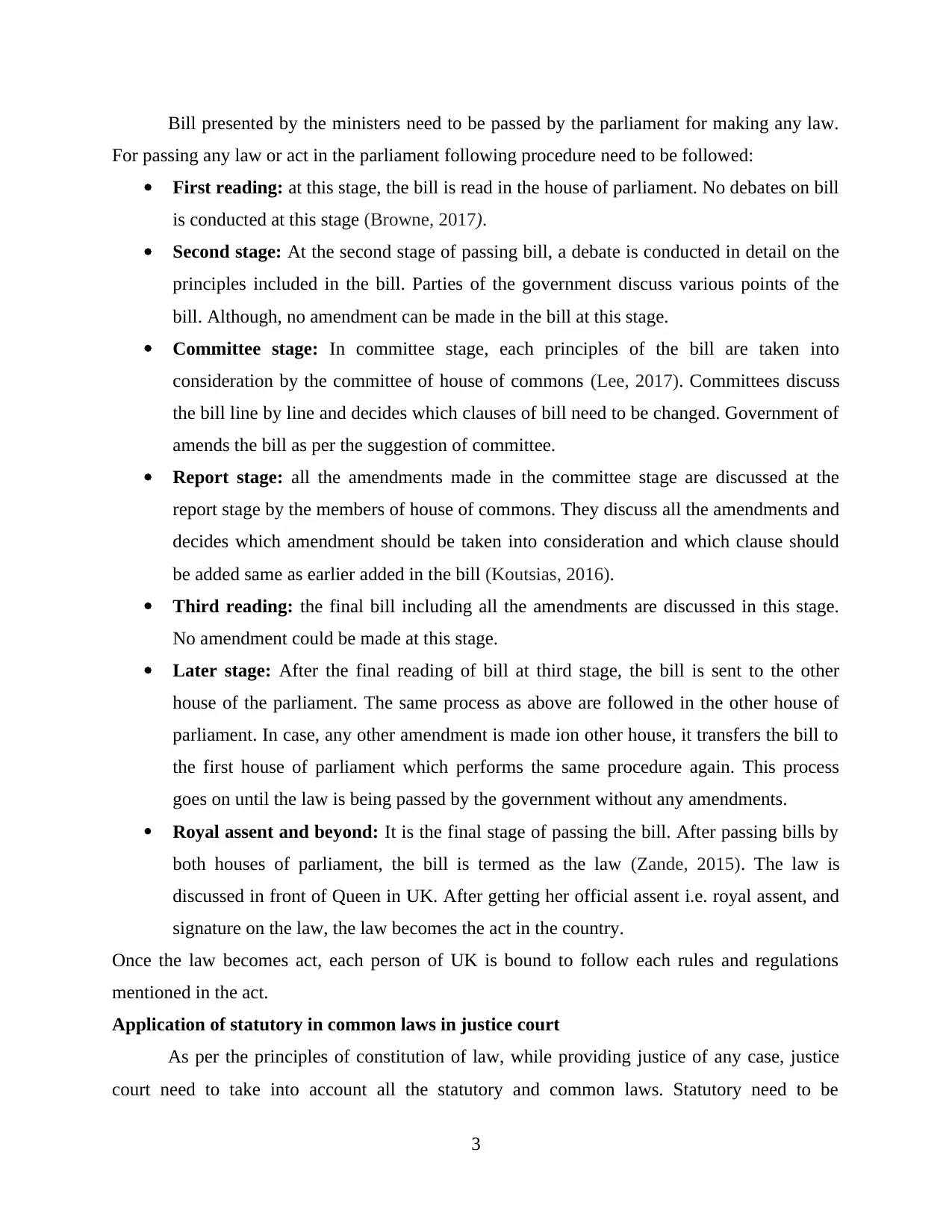
Bill presented by the ministers need to be passed by the parliament for making any law.
For passing any law or act in the parliament following procedure need to be followed:
First reading: at this stage, the bill is read in the house of parliament. No debates on bill
is conducted at this stage (Browne, 2017).
Second stage: At the second stage of passing bill, a debate is conducted in detail on the
principles included in the bill. Parties of the government discuss various points of the
bill. Although, no amendment can be made in the bill at this stage.
Committee stage: In committee stage, each principles of the bill are taken into
consideration by the committee of house of commons (Lee, 2017). Committees discuss
the bill line by line and decides which clauses of bill need to be changed. Government of
amends the bill as per the suggestion of committee.
Report stage: all the amendments made in the committee stage are discussed at the
report stage by the members of house of commons. They discuss all the amendments and
decides which amendment should be taken into consideration and which clause should
be added same as earlier added in the bill (Koutsias, 2016).
Third reading: the final bill including all the amendments are discussed in this stage.
No amendment could be made at this stage.
Later stage: After the final reading of bill at third stage, the bill is sent to the other
house of the parliament. The same process as above are followed in the other house of
parliament. In case, any other amendment is made ion other house, it transfers the bill to
the first house of parliament which performs the same procedure again. This process
goes on until the law is being passed by the government without any amendments.
Royal assent and beyond: It is the final stage of passing the bill. After passing bills by
both houses of parliament, the bill is termed as the law (Zande, 2015). The law is
discussed in front of Queen in UK. After getting her official assent i.e. royal assent, and
signature on the law, the law becomes the act in the country.
Once the law becomes act, each person of UK is bound to follow each rules and regulations
mentioned in the act.
Application of statutory in common laws in justice court
As per the principles of constitution of law, while providing justice of any case, justice
court need to take into account all the statutory and common laws. Statutory need to be
3
For passing any law or act in the parliament following procedure need to be followed:
First reading: at this stage, the bill is read in the house of parliament. No debates on bill
is conducted at this stage (Browne, 2017).
Second stage: At the second stage of passing bill, a debate is conducted in detail on the
principles included in the bill. Parties of the government discuss various points of the
bill. Although, no amendment can be made in the bill at this stage.
Committee stage: In committee stage, each principles of the bill are taken into
consideration by the committee of house of commons (Lee, 2017). Committees discuss
the bill line by line and decides which clauses of bill need to be changed. Government of
amends the bill as per the suggestion of committee.
Report stage: all the amendments made in the committee stage are discussed at the
report stage by the members of house of commons. They discuss all the amendments and
decides which amendment should be taken into consideration and which clause should
be added same as earlier added in the bill (Koutsias, 2016).
Third reading: the final bill including all the amendments are discussed in this stage.
No amendment could be made at this stage.
Later stage: After the final reading of bill at third stage, the bill is sent to the other
house of the parliament. The same process as above are followed in the other house of
parliament. In case, any other amendment is made ion other house, it transfers the bill to
the first house of parliament which performs the same procedure again. This process
goes on until the law is being passed by the government without any amendments.
Royal assent and beyond: It is the final stage of passing the bill. After passing bills by
both houses of parliament, the bill is termed as the law (Zande, 2015). The law is
discussed in front of Queen in UK. After getting her official assent i.e. royal assent, and
signature on the law, the law becomes the act in the country.
Once the law becomes act, each person of UK is bound to follow each rules and regulations
mentioned in the act.
Application of statutory in common laws in justice court
As per the principles of constitution of law, while providing justice of any case, justice
court need to take into account all the statutory and common laws. Statutory need to be
3
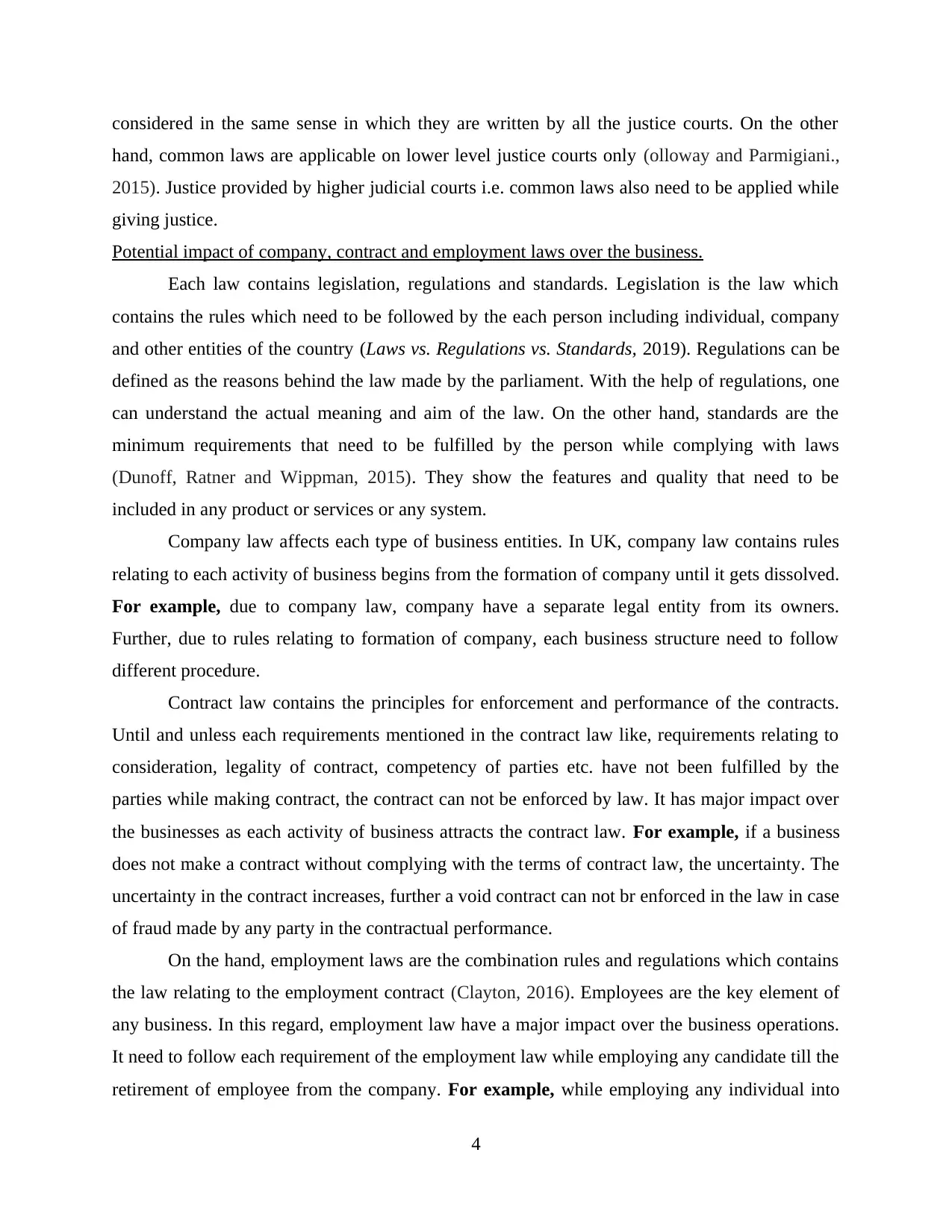
considered in the same sense in which they are written by all the justice courts. On the other
hand, common laws are applicable on lower level justice courts only (olloway and Parmigiani.,
2015). Justice provided by higher judicial courts i.e. common laws also need to be applied while
giving justice.
Potential impact of company, contract and employment laws over the business.
Each law contains legislation, regulations and standards. Legislation is the law which
contains the rules which need to be followed by the each person including individual, company
and other entities of the country (Laws vs. Regulations vs. Standards, 2019). Regulations can be
defined as the reasons behind the law made by the parliament. With the help of regulations, one
can understand the actual meaning and aim of the law. On the other hand, standards are the
minimum requirements that need to be fulfilled by the person while complying with laws
(Dunoff, Ratner and Wippman, 2015). They show the features and quality that need to be
included in any product or services or any system.
Company law affects each type of business entities. In UK, company law contains rules
relating to each activity of business begins from the formation of company until it gets dissolved.
For example, due to company law, company have a separate legal entity from its owners.
Further, due to rules relating to formation of company, each business structure need to follow
different procedure.
Contract law contains the principles for enforcement and performance of the contracts.
Until and unless each requirements mentioned in the contract law like, requirements relating to
consideration, legality of contract, competency of parties etc. have not been fulfilled by the
parties while making contract, the contract can not be enforced by law. It has major impact over
the businesses as each activity of business attracts the contract law. For example, if a business
does not make a contract without complying with the terms of contract law, the uncertainty. The
uncertainty in the contract increases, further a void contract can not br enforced in the law in case
of fraud made by any party in the contractual performance.
On the hand, employment laws are the combination rules and regulations which contains
the law relating to the employment contract (Clayton, 2016). Employees are the key element of
any business. In this regard, employment law have a major impact over the business operations.
It need to follow each requirement of the employment law while employing any candidate till the
retirement of employee from the company. For example, while employing any individual into
4
hand, common laws are applicable on lower level justice courts only (olloway and Parmigiani.,
2015). Justice provided by higher judicial courts i.e. common laws also need to be applied while
giving justice.
Potential impact of company, contract and employment laws over the business.
Each law contains legislation, regulations and standards. Legislation is the law which
contains the rules which need to be followed by the each person including individual, company
and other entities of the country (Laws vs. Regulations vs. Standards, 2019). Regulations can be
defined as the reasons behind the law made by the parliament. With the help of regulations, one
can understand the actual meaning and aim of the law. On the other hand, standards are the
minimum requirements that need to be fulfilled by the person while complying with laws
(Dunoff, Ratner and Wippman, 2015). They show the features and quality that need to be
included in any product or services or any system.
Company law affects each type of business entities. In UK, company law contains rules
relating to each activity of business begins from the formation of company until it gets dissolved.
For example, due to company law, company have a separate legal entity from its owners.
Further, due to rules relating to formation of company, each business structure need to follow
different procedure.
Contract law contains the principles for enforcement and performance of the contracts.
Until and unless each requirements mentioned in the contract law like, requirements relating to
consideration, legality of contract, competency of parties etc. have not been fulfilled by the
parties while making contract, the contract can not be enforced by law. It has major impact over
the businesses as each activity of business attracts the contract law. For example, if a business
does not make a contract without complying with the terms of contract law, the uncertainty. The
uncertainty in the contract increases, further a void contract can not br enforced in the law in case
of fraud made by any party in the contractual performance.
On the hand, employment laws are the combination rules and regulations which contains
the law relating to the employment contract (Clayton, 2016). Employees are the key element of
any business. In this regard, employment law have a major impact over the business operations.
It need to follow each requirement of the employment law while employing any candidate till the
retirement of employee from the company. For example, while employing any individual into
4
⊘ This is a preview!⊘
Do you want full access?
Subscribe today to unlock all pages.

Trusted by 1+ million students worldwide
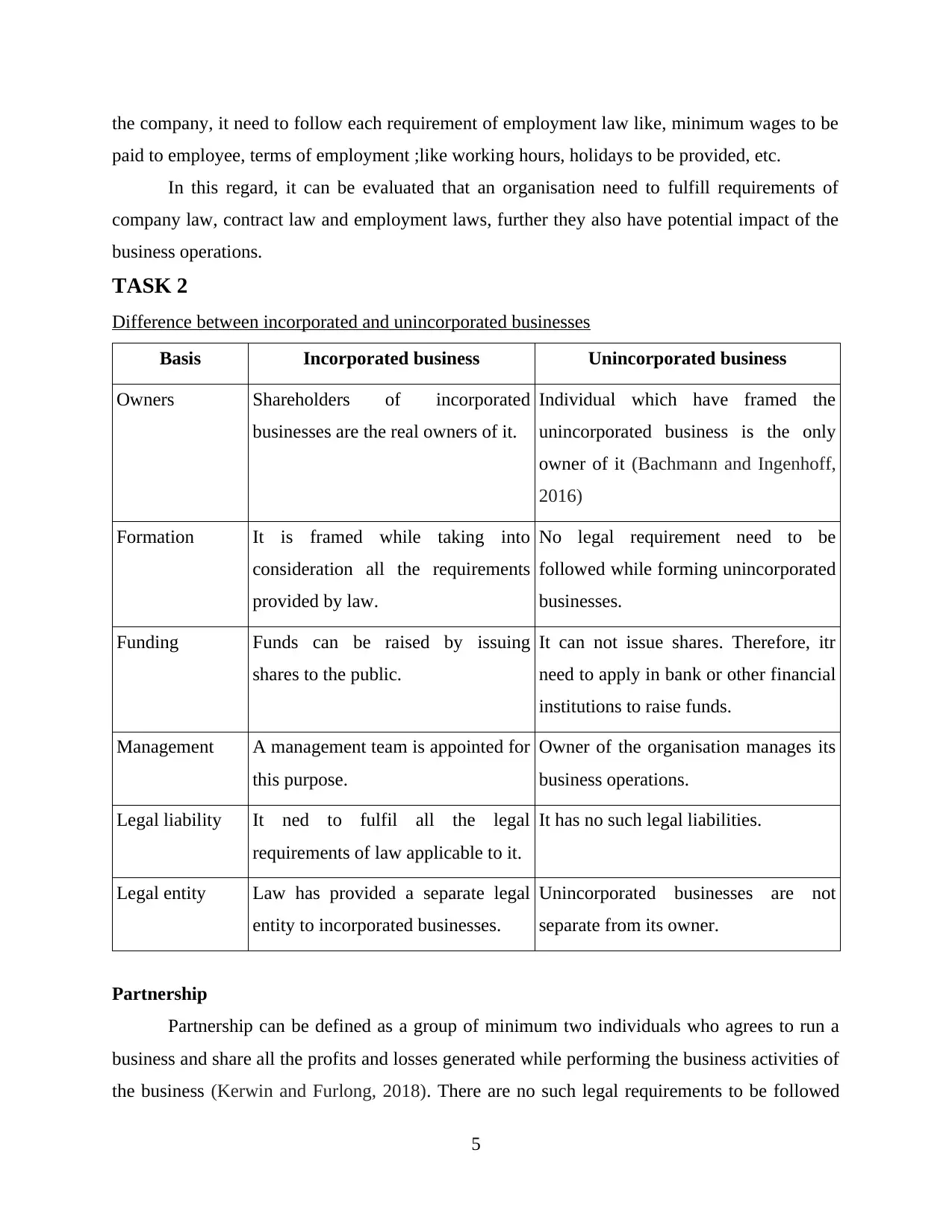
the company, it need to follow each requirement of employment law like, minimum wages to be
paid to employee, terms of employment ;like working hours, holidays to be provided, etc.
In this regard, it can be evaluated that an organisation need to fulfill requirements of
company law, contract law and employment laws, further they also have potential impact of the
business operations.
TASK 2
Difference between incorporated and unincorporated businesses
Basis Incorporated business Unincorporated business
Owners Shareholders of incorporated
businesses are the real owners of it.
Individual which have framed the
unincorporated business is the only
owner of it (Bachmann and Ingenhoff,
2016)
Formation It is framed while taking into
consideration all the requirements
provided by law.
No legal requirement need to be
followed while forming unincorporated
businesses.
Funding Funds can be raised by issuing
shares to the public.
It can not issue shares. Therefore, itr
need to apply in bank or other financial
institutions to raise funds.
Management A management team is appointed for
this purpose.
Owner of the organisation manages its
business operations.
Legal liability It ned to fulfil all the legal
requirements of law applicable to it.
It has no such legal liabilities.
Legal entity Law has provided a separate legal
entity to incorporated businesses.
Unincorporated businesses are not
separate from its owner.
Partnership
Partnership can be defined as a group of minimum two individuals who agrees to run a
business and share all the profits and losses generated while performing the business activities of
the business (Kerwin and Furlong, 2018). There are no such legal requirements to be followed
5
paid to employee, terms of employment ;like working hours, holidays to be provided, etc.
In this regard, it can be evaluated that an organisation need to fulfill requirements of
company law, contract law and employment laws, further they also have potential impact of the
business operations.
TASK 2
Difference between incorporated and unincorporated businesses
Basis Incorporated business Unincorporated business
Owners Shareholders of incorporated
businesses are the real owners of it.
Individual which have framed the
unincorporated business is the only
owner of it (Bachmann and Ingenhoff,
2016)
Formation It is framed while taking into
consideration all the requirements
provided by law.
No legal requirement need to be
followed while forming unincorporated
businesses.
Funding Funds can be raised by issuing
shares to the public.
It can not issue shares. Therefore, itr
need to apply in bank or other financial
institutions to raise funds.
Management A management team is appointed for
this purpose.
Owner of the organisation manages its
business operations.
Legal liability It ned to fulfil all the legal
requirements of law applicable to it.
It has no such legal liabilities.
Legal entity Law has provided a separate legal
entity to incorporated businesses.
Unincorporated businesses are not
separate from its owner.
Partnership
Partnership can be defined as a group of minimum two individuals who agrees to run a
business and share all the profits and losses generated while performing the business activities of
the business (Kerwin and Furlong, 2018). There are no such legal requirements to be followed
5
Paraphrase This Document
Need a fresh take? Get an instant paraphrase of this document with our AI Paraphraser
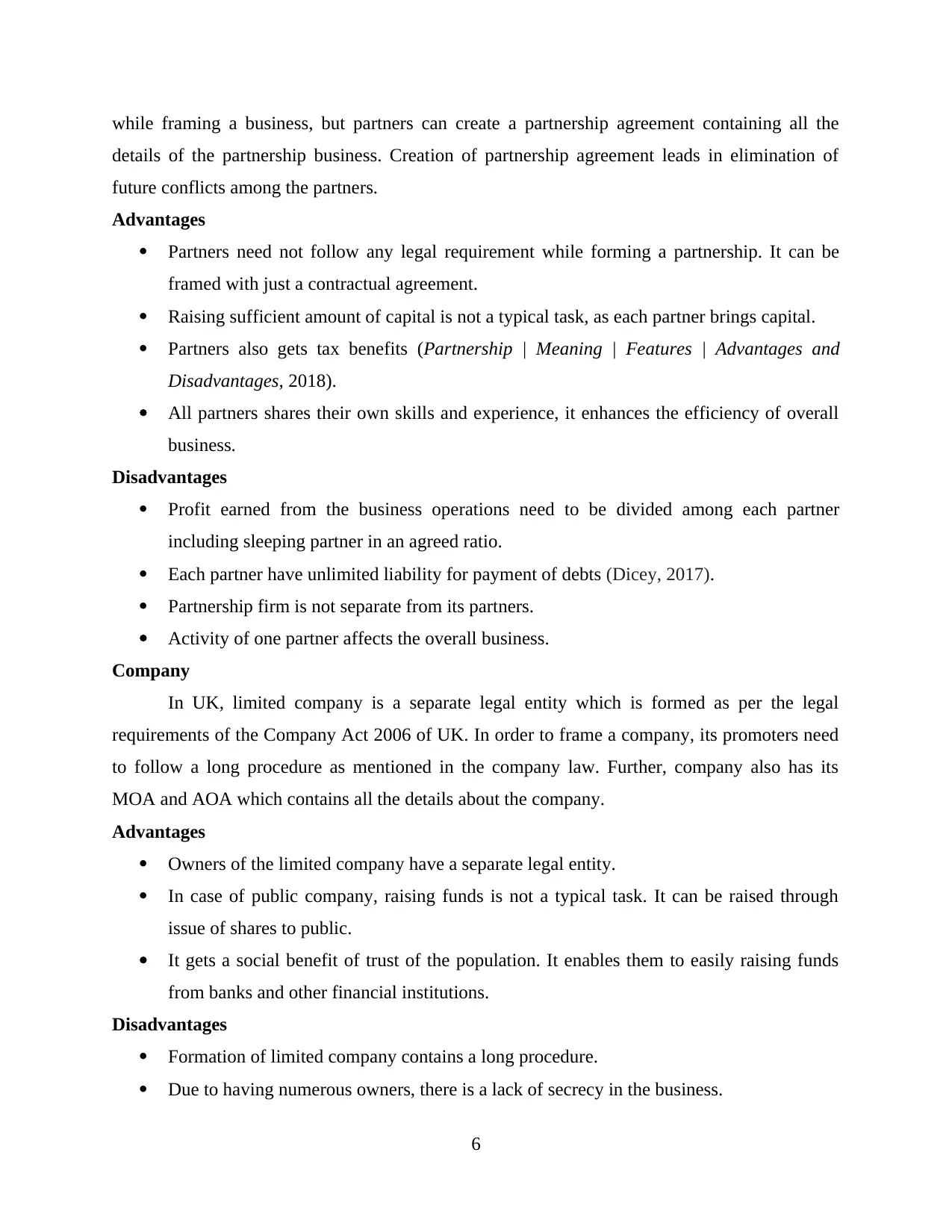
while framing a business, but partners can create a partnership agreement containing all the
details of the partnership business. Creation of partnership agreement leads in elimination of
future conflicts among the partners.
Advantages
Partners need not follow any legal requirement while forming a partnership. It can be
framed with just a contractual agreement.
Raising sufficient amount of capital is not a typical task, as each partner brings capital.
Partners also gets tax benefits (Partnership | Meaning | Features | Advantages and
Disadvantages, 2018).
All partners shares their own skills and experience, it enhances the efficiency of overall
business.
Disadvantages
Profit earned from the business operations need to be divided among each partner
including sleeping partner in an agreed ratio.
Each partner have unlimited liability for payment of debts (Dicey, 2017).
Partnership firm is not separate from its partners.
Activity of one partner affects the overall business.
Company
In UK, limited company is a separate legal entity which is formed as per the legal
requirements of the Company Act 2006 of UK. In order to frame a company, its promoters need
to follow a long procedure as mentioned in the company law. Further, company also has its
MOA and AOA which contains all the details about the company.
Advantages
Owners of the limited company have a separate legal entity.
In case of public company, raising funds is not a typical task. It can be raised through
issue of shares to public.
It gets a social benefit of trust of the population. It enables them to easily raising funds
from banks and other financial institutions.
Disadvantages
Formation of limited company contains a long procedure.
Due to having numerous owners, there is a lack of secrecy in the business.
6
details of the partnership business. Creation of partnership agreement leads in elimination of
future conflicts among the partners.
Advantages
Partners need not follow any legal requirement while forming a partnership. It can be
framed with just a contractual agreement.
Raising sufficient amount of capital is not a typical task, as each partner brings capital.
Partners also gets tax benefits (Partnership | Meaning | Features | Advantages and
Disadvantages, 2018).
All partners shares their own skills and experience, it enhances the efficiency of overall
business.
Disadvantages
Profit earned from the business operations need to be divided among each partner
including sleeping partner in an agreed ratio.
Each partner have unlimited liability for payment of debts (Dicey, 2017).
Partnership firm is not separate from its partners.
Activity of one partner affects the overall business.
Company
In UK, limited company is a separate legal entity which is formed as per the legal
requirements of the Company Act 2006 of UK. In order to frame a company, its promoters need
to follow a long procedure as mentioned in the company law. Further, company also has its
MOA and AOA which contains all the details about the company.
Advantages
Owners of the limited company have a separate legal entity.
In case of public company, raising funds is not a typical task. It can be raised through
issue of shares to public.
It gets a social benefit of trust of the population. It enables them to easily raising funds
from banks and other financial institutions.
Disadvantages
Formation of limited company contains a long procedure.
Due to having numerous owners, there is a lack of secrecy in the business.
6
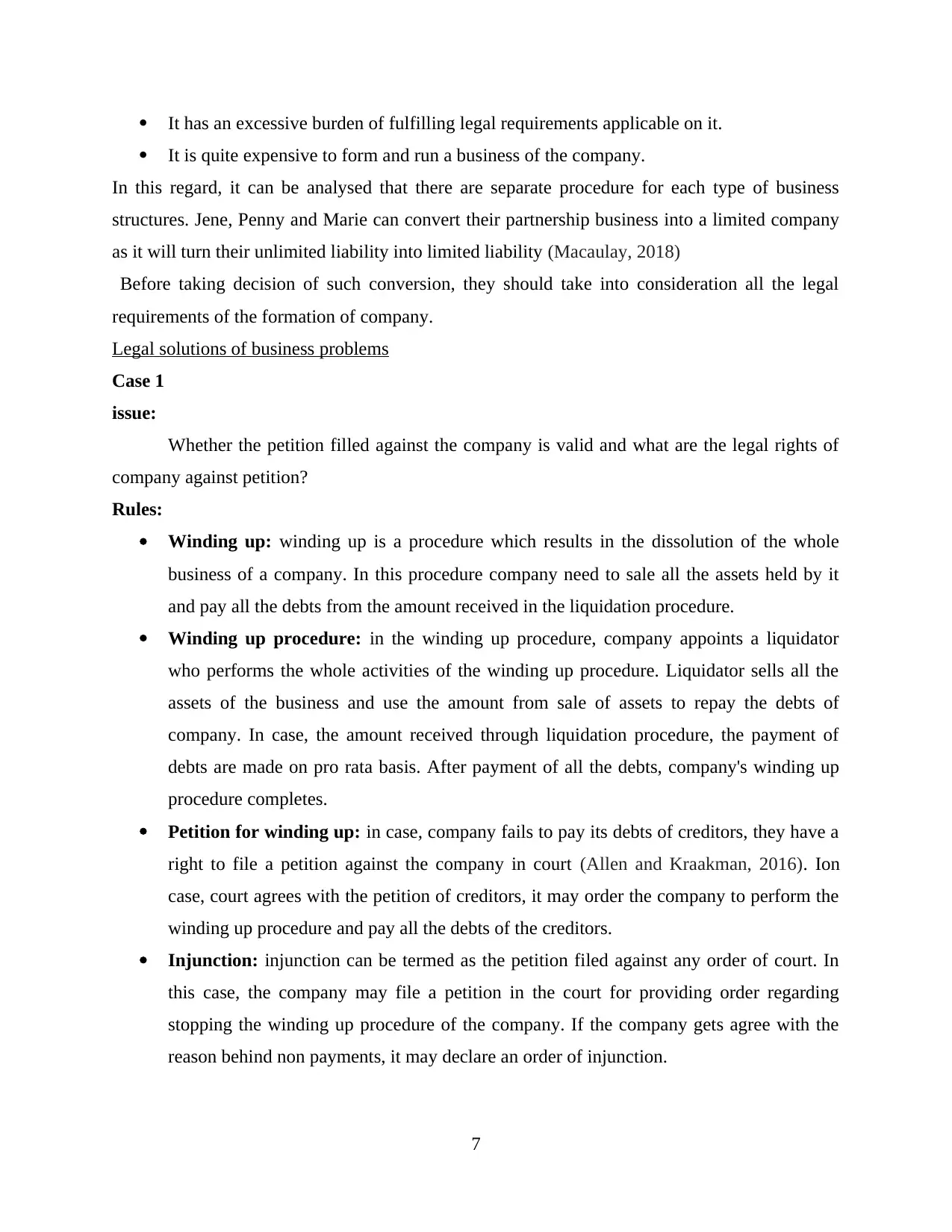
It has an excessive burden of fulfilling legal requirements applicable on it.
It is quite expensive to form and run a business of the company.
In this regard, it can be analysed that there are separate procedure for each type of business
structures. Jene, Penny and Marie can convert their partnership business into a limited company
as it will turn their unlimited liability into limited liability (Macaulay, 2018)
Before taking decision of such conversion, they should take into consideration all the legal
requirements of the formation of company.
Legal solutions of business problems
Case 1
issue:
Whether the petition filled against the company is valid and what are the legal rights of
company against petition?
Rules:
Winding up: winding up is a procedure which results in the dissolution of the whole
business of a company. In this procedure company need to sale all the assets held by it
and pay all the debts from the amount received in the liquidation procedure.
Winding up procedure: in the winding up procedure, company appoints a liquidator
who performs the whole activities of the winding up procedure. Liquidator sells all the
assets of the business and use the amount from sale of assets to repay the debts of
company. In case, the amount received through liquidation procedure, the payment of
debts are made on pro rata basis. After payment of all the debts, company's winding up
procedure completes.
Petition for winding up: in case, company fails to pay its debts of creditors, they have a
right to file a petition against the company in court (Allen and Kraakman, 2016). Ion
case, court agrees with the petition of creditors, it may order the company to perform the
winding up procedure and pay all the debts of the creditors.
Injunction: injunction can be termed as the petition filed against any order of court. In
this case, the company may file a petition in the court for providing order regarding
stopping the winding up procedure of the company. If the company gets agree with the
reason behind non payments, it may declare an order of injunction.
7
It is quite expensive to form and run a business of the company.
In this regard, it can be analysed that there are separate procedure for each type of business
structures. Jene, Penny and Marie can convert their partnership business into a limited company
as it will turn their unlimited liability into limited liability (Macaulay, 2018)
Before taking decision of such conversion, they should take into consideration all the legal
requirements of the formation of company.
Legal solutions of business problems
Case 1
issue:
Whether the petition filled against the company is valid and what are the legal rights of
company against petition?
Rules:
Winding up: winding up is a procedure which results in the dissolution of the whole
business of a company. In this procedure company need to sale all the assets held by it
and pay all the debts from the amount received in the liquidation procedure.
Winding up procedure: in the winding up procedure, company appoints a liquidator
who performs the whole activities of the winding up procedure. Liquidator sells all the
assets of the business and use the amount from sale of assets to repay the debts of
company. In case, the amount received through liquidation procedure, the payment of
debts are made on pro rata basis. After payment of all the debts, company's winding up
procedure completes.
Petition for winding up: in case, company fails to pay its debts of creditors, they have a
right to file a petition against the company in court (Allen and Kraakman, 2016). Ion
case, court agrees with the petition of creditors, it may order the company to perform the
winding up procedure and pay all the debts of the creditors.
Injunction: injunction can be termed as the petition filed against any order of court. In
this case, the company may file a petition in the court for providing order regarding
stopping the winding up procedure of the company. If the company gets agree with the
reason behind non payments, it may declare an order of injunction.
7
⊘ This is a preview!⊘
Do you want full access?
Subscribe today to unlock all pages.

Trusted by 1+ million students worldwide
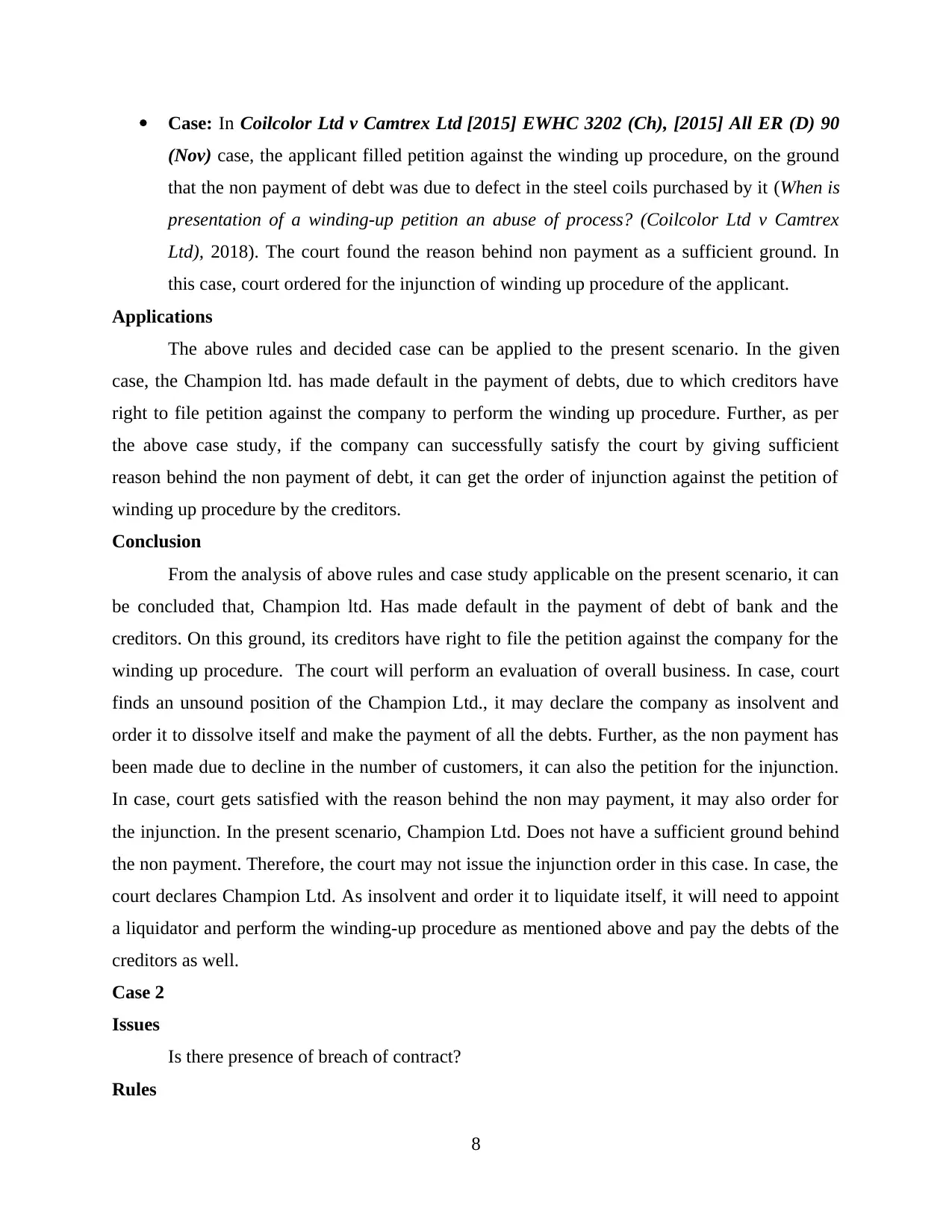
Case: In Coilcolor Ltd v Camtrex Ltd [2015] EWHC 3202 (Ch), [2015] All ER (D) 90
(Nov) case, the applicant filled petition against the winding up procedure, on the ground
that the non payment of debt was due to defect in the steel coils purchased by it (When is
presentation of a winding-up petition an abuse of process? (Coilcolor Ltd v Camtrex
Ltd), 2018). The court found the reason behind non payment as a sufficient ground. In
this case, court ordered for the injunction of winding up procedure of the applicant.
Applications
The above rules and decided case can be applied to the present scenario. In the given
case, the Champion ltd. has made default in the payment of debts, due to which creditors have
right to file petition against the company to perform the winding up procedure. Further, as per
the above case study, if the company can successfully satisfy the court by giving sufficient
reason behind the non payment of debt, it can get the order of injunction against the petition of
winding up procedure by the creditors.
Conclusion
From the analysis of above rules and case study applicable on the present scenario, it can
be concluded that, Champion ltd. Has made default in the payment of debt of bank and the
creditors. On this ground, its creditors have right to file the petition against the company for the
winding up procedure. The court will perform an evaluation of overall business. In case, court
finds an unsound position of the Champion Ltd., it may declare the company as insolvent and
order it to dissolve itself and make the payment of all the debts. Further, as the non payment has
been made due to decline in the number of customers, it can also the petition for the injunction.
In case, court gets satisfied with the reason behind the non may payment, it may also order for
the injunction. In the present scenario, Champion Ltd. Does not have a sufficient ground behind
the non payment. Therefore, the court may not issue the injunction order in this case. In case, the
court declares Champion Ltd. As insolvent and order it to liquidate itself, it will need to appoint
a liquidator and perform the winding-up procedure as mentioned above and pay the debts of the
creditors as well.
Case 2
Issues
Is there presence of breach of contract?
Rules
8
(Nov) case, the applicant filled petition against the winding up procedure, on the ground
that the non payment of debt was due to defect in the steel coils purchased by it (When is
presentation of a winding-up petition an abuse of process? (Coilcolor Ltd v Camtrex
Ltd), 2018). The court found the reason behind non payment as a sufficient ground. In
this case, court ordered for the injunction of winding up procedure of the applicant.
Applications
The above rules and decided case can be applied to the present scenario. In the given
case, the Champion ltd. has made default in the payment of debts, due to which creditors have
right to file petition against the company to perform the winding up procedure. Further, as per
the above case study, if the company can successfully satisfy the court by giving sufficient
reason behind the non payment of debt, it can get the order of injunction against the petition of
winding up procedure by the creditors.
Conclusion
From the analysis of above rules and case study applicable on the present scenario, it can
be concluded that, Champion ltd. Has made default in the payment of debt of bank and the
creditors. On this ground, its creditors have right to file the petition against the company for the
winding up procedure. The court will perform an evaluation of overall business. In case, court
finds an unsound position of the Champion Ltd., it may declare the company as insolvent and
order it to dissolve itself and make the payment of all the debts. Further, as the non payment has
been made due to decline in the number of customers, it can also the petition for the injunction.
In case, court gets satisfied with the reason behind the non may payment, it may also order for
the injunction. In the present scenario, Champion Ltd. Does not have a sufficient ground behind
the non payment. Therefore, the court may not issue the injunction order in this case. In case, the
court declares Champion Ltd. As insolvent and order it to liquidate itself, it will need to appoint
a liquidator and perform the winding-up procedure as mentioned above and pay the debts of the
creditors as well.
Case 2
Issues
Is there presence of breach of contract?
Rules
8
Paraphrase This Document
Need a fresh take? Get an instant paraphrase of this document with our AI Paraphraser
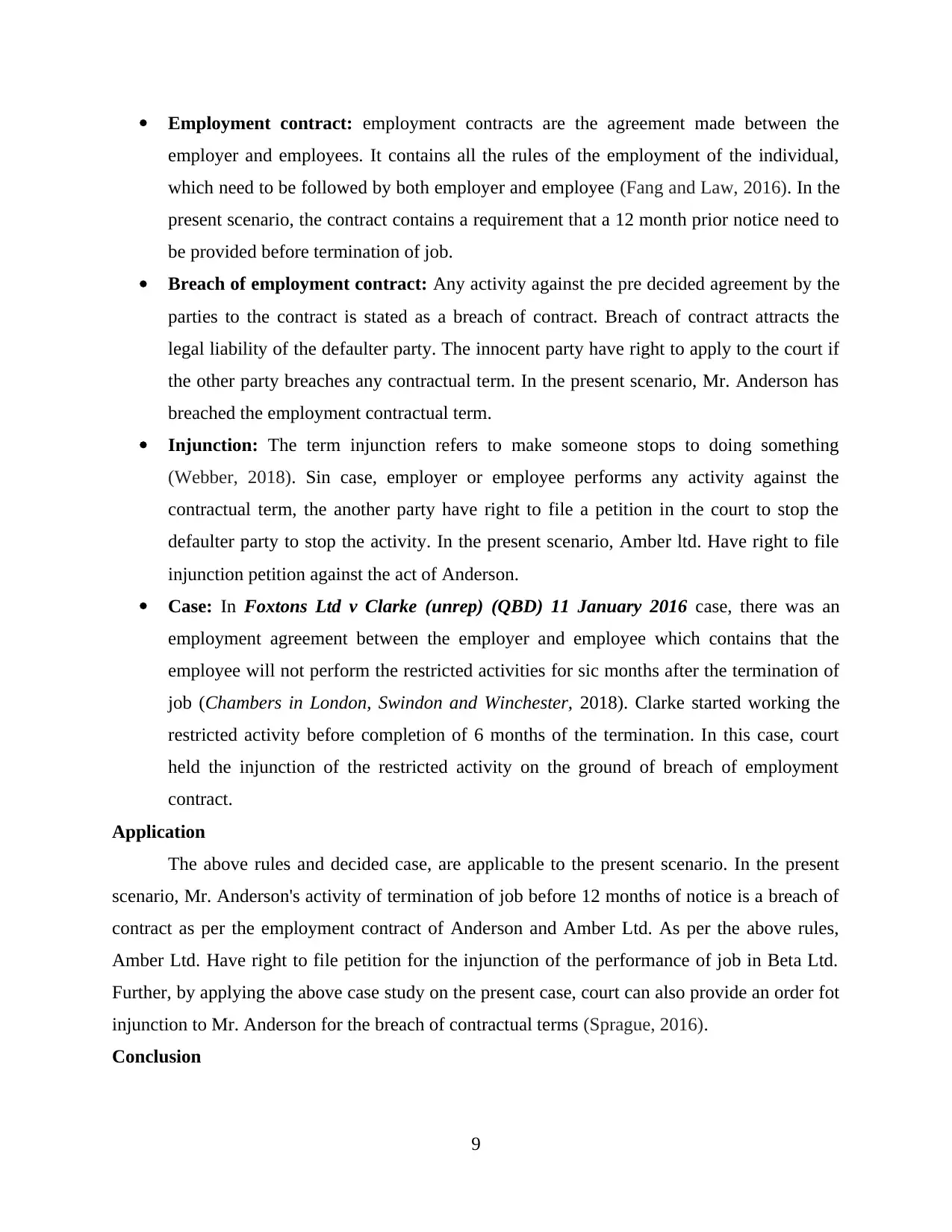
Employment contract: employment contracts are the agreement made between the
employer and employees. It contains all the rules of the employment of the individual,
which need to be followed by both employer and employee (Fang and Law, 2016). In the
present scenario, the contract contains a requirement that a 12 month prior notice need to
be provided before termination of job.
Breach of employment contract: Any activity against the pre decided agreement by the
parties to the contract is stated as a breach of contract. Breach of contract attracts the
legal liability of the defaulter party. The innocent party have right to apply to the court if
the other party breaches any contractual term. In the present scenario, Mr. Anderson has
breached the employment contractual term.
Injunction: The term injunction refers to make someone stops to doing something
(Webber, 2018). Sin case, employer or employee performs any activity against the
contractual term, the another party have right to file a petition in the court to stop the
defaulter party to stop the activity. In the present scenario, Amber ltd. Have right to file
injunction petition against the act of Anderson.
Case: In Foxtons Ltd v Clarke (unrep) (QBD) 11 January 2016 case, there was an
employment agreement between the employer and employee which contains that the
employee will not perform the restricted activities for sic months after the termination of
job (Chambers in London, Swindon and Winchester, 2018). Clarke started working the
restricted activity before completion of 6 months of the termination. In this case, court
held the injunction of the restricted activity on the ground of breach of employment
contract.
Application
The above rules and decided case, are applicable to the present scenario. In the present
scenario, Mr. Anderson's activity of termination of job before 12 months of notice is a breach of
contract as per the employment contract of Anderson and Amber Ltd. As per the above rules,
Amber Ltd. Have right to file petition for the injunction of the performance of job in Beta Ltd.
Further, by applying the above case study on the present case, court can also provide an order fot
injunction to Mr. Anderson for the breach of contractual terms (Sprague, 2016).
Conclusion
9
employer and employees. It contains all the rules of the employment of the individual,
which need to be followed by both employer and employee (Fang and Law, 2016). In the
present scenario, the contract contains a requirement that a 12 month prior notice need to
be provided before termination of job.
Breach of employment contract: Any activity against the pre decided agreement by the
parties to the contract is stated as a breach of contract. Breach of contract attracts the
legal liability of the defaulter party. The innocent party have right to apply to the court if
the other party breaches any contractual term. In the present scenario, Mr. Anderson has
breached the employment contractual term.
Injunction: The term injunction refers to make someone stops to doing something
(Webber, 2018). Sin case, employer or employee performs any activity against the
contractual term, the another party have right to file a petition in the court to stop the
defaulter party to stop the activity. In the present scenario, Amber ltd. Have right to file
injunction petition against the act of Anderson.
Case: In Foxtons Ltd v Clarke (unrep) (QBD) 11 January 2016 case, there was an
employment agreement between the employer and employee which contains that the
employee will not perform the restricted activities for sic months after the termination of
job (Chambers in London, Swindon and Winchester, 2018). Clarke started working the
restricted activity before completion of 6 months of the termination. In this case, court
held the injunction of the restricted activity on the ground of breach of employment
contract.
Application
The above rules and decided case, are applicable to the present scenario. In the present
scenario, Mr. Anderson's activity of termination of job before 12 months of notice is a breach of
contract as per the employment contract of Anderson and Amber Ltd. As per the above rules,
Amber Ltd. Have right to file petition for the injunction of the performance of job in Beta Ltd.
Further, by applying the above case study on the present case, court can also provide an order fot
injunction to Mr. Anderson for the breach of contractual terms (Sprague, 2016).
Conclusion
9
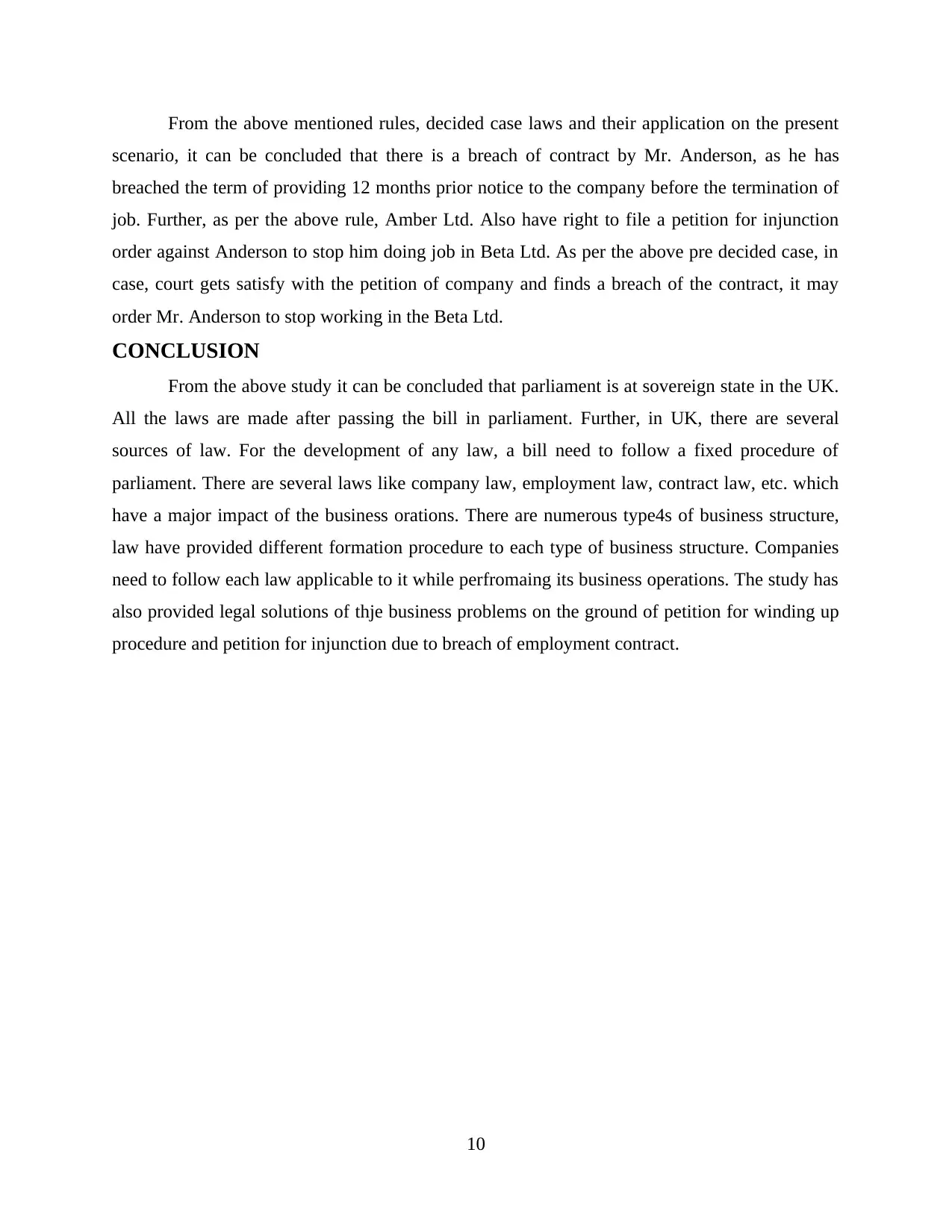
From the above mentioned rules, decided case laws and their application on the present
scenario, it can be concluded that there is a breach of contract by Mr. Anderson, as he has
breached the term of providing 12 months prior notice to the company before the termination of
job. Further, as per the above rule, Amber Ltd. Also have right to file a petition for injunction
order against Anderson to stop him doing job in Beta Ltd. As per the above pre decided case, in
case, court gets satisfy with the petition of company and finds a breach of the contract, it may
order Mr. Anderson to stop working in the Beta Ltd.
CONCLUSION
From the above study it can be concluded that parliament is at sovereign state in the UK.
All the laws are made after passing the bill in parliament. Further, in UK, there are several
sources of law. For the development of any law, a bill need to follow a fixed procedure of
parliament. There are several laws like company law, employment law, contract law, etc. which
have a major impact of the business orations. There are numerous type4s of business structure,
law have provided different formation procedure to each type of business structure. Companies
need to follow each law applicable to it while perfromaing its business operations. The study has
also provided legal solutions of thje business problems on the ground of petition for winding up
procedure and petition for injunction due to breach of employment contract.
10
scenario, it can be concluded that there is a breach of contract by Mr. Anderson, as he has
breached the term of providing 12 months prior notice to the company before the termination of
job. Further, as per the above rule, Amber Ltd. Also have right to file a petition for injunction
order against Anderson to stop him doing job in Beta Ltd. As per the above pre decided case, in
case, court gets satisfy with the petition of company and finds a breach of the contract, it may
order Mr. Anderson to stop working in the Beta Ltd.
CONCLUSION
From the above study it can be concluded that parliament is at sovereign state in the UK.
All the laws are made after passing the bill in parliament. Further, in UK, there are several
sources of law. For the development of any law, a bill need to follow a fixed procedure of
parliament. There are several laws like company law, employment law, contract law, etc. which
have a major impact of the business orations. There are numerous type4s of business structure,
law have provided different formation procedure to each type of business structure. Companies
need to follow each law applicable to it while perfromaing its business operations. The study has
also provided legal solutions of thje business problems on the ground of petition for winding up
procedure and petition for injunction due to breach of employment contract.
10
⊘ This is a preview!⊘
Do you want full access?
Subscribe today to unlock all pages.

Trusted by 1+ million students worldwide
1 out of 14
Related Documents
Your All-in-One AI-Powered Toolkit for Academic Success.
+13062052269
info@desklib.com
Available 24*7 on WhatsApp / Email
![[object Object]](/_next/static/media/star-bottom.7253800d.svg)
Unlock your academic potential
Copyright © 2020–2026 A2Z Services. All Rights Reserved. Developed and managed by ZUCOL.



